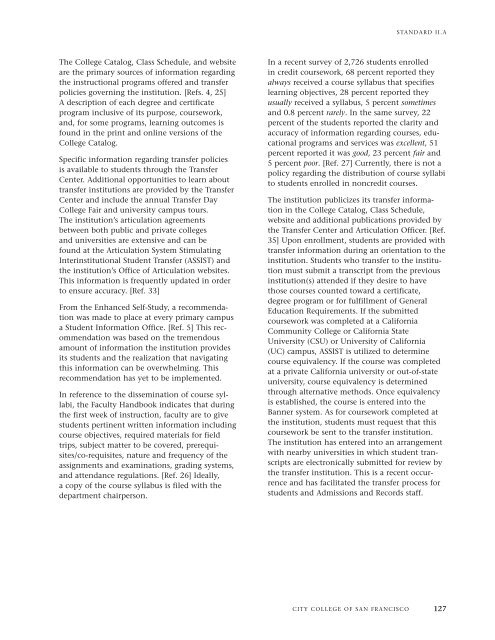City College of San Francisco - California Competes
City College of San Francisco - California Competes
City College of San Francisco - California Competes
You also want an ePaper? Increase the reach of your titles
YUMPU automatically turns print PDFs into web optimized ePapers that Google loves.
STANDARD II.A<br />
The <strong>College</strong> Catalog, Class Schedule, and website<br />
are the primary sources <strong>of</strong> information regarding<br />
the instructional programs <strong>of</strong>fered and transfer<br />
policies governing the institution. [Refs. 4, 25]<br />
A description <strong>of</strong> each degree and certificate<br />
program inclusive <strong>of</strong> its purpose, coursework,<br />
and, for some programs, learning outcomes is<br />
found in the print and online versions <strong>of</strong> the<br />
<strong>College</strong> Catalog.<br />
Specific information regarding transfer policies<br />
is available to students through the Transfer<br />
Center. Additional opportunities to learn about<br />
transfer institutions are provided by the Transfer<br />
Center and include the annual Transfer Day<br />
<strong>College</strong> Fair and university campus tours.<br />
The institution’s articulation agreements<br />
between both public and private colleges<br />
and universities are extensive and can be<br />
found at the Articulation System Stimulating<br />
Interinstitutional Student Transfer (ASSIST) and<br />
the institution’s Office <strong>of</strong> Articulation websites.<br />
This information is frequently updated in order<br />
to ensure accuracy. [Ref. 33]<br />
From the Enhanced Self-Study, a recommendation<br />
was made to place at every primary campus<br />
a Student Information Office. [Ref. 5] This recommendation<br />
was based on the tremendous<br />
amount <strong>of</strong> information the institution provides<br />
its students and the realization that navigating<br />
this information can be overwhelming. This<br />
recommendation has yet to be implemented.<br />
In reference to the dissemination <strong>of</strong> course syllabi,<br />
the Faculty Handbook indicates that during<br />
the first week <strong>of</strong> instruction, faculty are to give<br />
students pertinent written information including<br />
course objectives, required materials for field<br />
trips, subject matter to be covered, prerequisites/co-requisites,<br />
nature and frequency <strong>of</strong> the<br />
assignments and examinations, grading systems,<br />
and attendance regulations. [Ref. 26] Ideally,<br />
a copy <strong>of</strong> the course syllabus is filed with the<br />
department chairperson.<br />
In a recent survey <strong>of</strong> 2,726 students enrolled<br />
in credit coursework, 68 percent reported they<br />
always received a course syllabus that specifies<br />
learning objectives, 28 percent reported they<br />
usually received a syllabus, 5 percent sometimes<br />
and 0.8 percent rarely. In the same survey, 22<br />
percent <strong>of</strong> the students reported the clarity and<br />
accuracy <strong>of</strong> information regarding courses, educational<br />
programs and services was excellent, 51<br />
percent reported it was good, 23 percent fair and<br />
5 percent poor. [Ref. 27] Currently, there is not a<br />
policy regarding the distribution <strong>of</strong> course syllabi<br />
to students enrolled in noncredit courses.<br />
The institution publicizes its transfer information<br />
in the <strong>College</strong> Catalog, Class Schedule,<br />
website and additional publications provided by<br />
the Transfer Center and Articulation Officer. [Ref.<br />
35] Upon enrollment, students are provided with<br />
transfer information during an orientation to the<br />
institution. Students who transfer to the institution<br />
must submit a transcript from the previous<br />
institution(s) attended if they desire to have<br />
those courses counted toward a certificate,<br />
degree program or for fulfillment <strong>of</strong> General<br />
Education Requirements. If the submitted<br />
coursework was completed at a <strong>California</strong><br />
Community <strong>College</strong> or <strong>California</strong> State<br />
University (CSU) or University <strong>of</strong> <strong>California</strong><br />
(UC) campus, ASSIST is utilized to determine<br />
course equivalency. If the course was completed<br />
at a private <strong>California</strong> university or out-<strong>of</strong>-state<br />
university, course equivalency is determined<br />
through alternative methods. Once equivalency<br />
is established, the course is entered into the<br />
Banner system. As for coursework completed at<br />
the institution, students must request that this<br />
coursework be sent to the transfer institution.<br />
The institution has entered into an arrangement<br />
with nearby universities in which student transcripts<br />
are electronically submitted for review by<br />
the transfer institution. This is a recent occurrence<br />
and has facilitated the transfer process for<br />
students and Admissions and Records staff.<br />
CITY COLLEGE OF SAN FRANCISCO<br />
127







